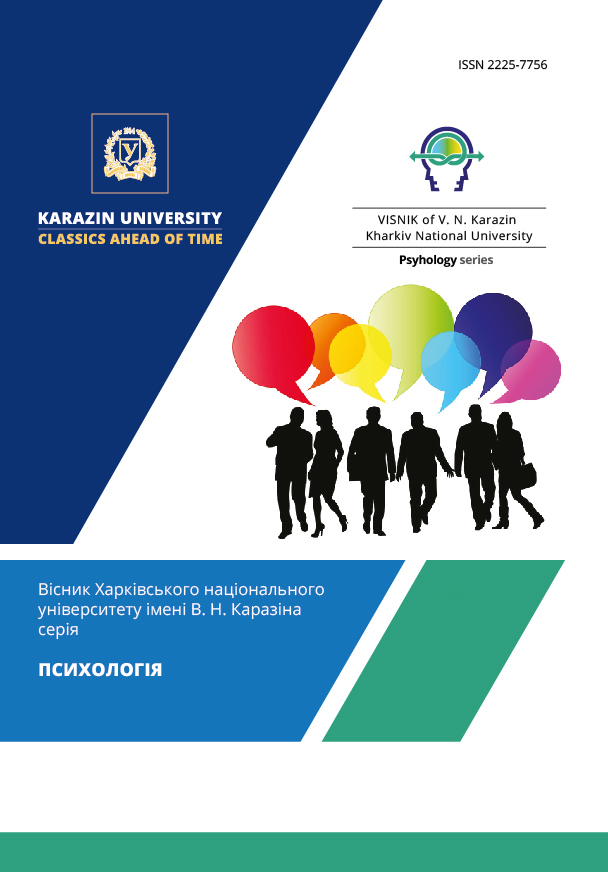Autobiographical Memory in Persons with Psycho-Emotional Disorders During the War
Abstract
The article describes the results of autobiographical memory problem studying in the context of violations of the emotional sphere of an individual, namely in persons who have different levels of emotional stability during the full-scale war in Ukraine. The peculiarities of autobiographical memory were determined among three clusters of subjects: with high PTSD scores, elevated levels of depression, and without recorded disorders of the emotional sphere. According to the results of the empirical study, a significantly higher level of emotional coloring of the content of the recent past memories was recorded in subjects with high rates of PTSD and depression compared to subjects without disturbances of emotional stability. Persons with signs of post-traumatic stress disorder reproduce emotionally colored memories in the form of monosyllabic impersonal sentences, avoiding mental immersion in the details of events, while in persons with signs of depression, emotionally colored memories are accompanied by perceptual-image brightness of their content. Individuals with symptoms of PTSD and depression reproduce many emotions when recalling personal experiences, do not ignore personally significant negative and positive events of the past, but focus more on their own emotional experience. In general, in subjects with signs of emotional disorders, generalized, monosyllabic emotional memories prevail in number over perceptually colored ones and are characterized by the fragmentary nature of the content reproduced in them. Subjects without emotional disturbances tend to reproduce detailed and perceptually colored memories during arbitrary reproduction. Individuals without disorders of emotional stability also tend to accompany personal memories with their own reflections and figurative details. Emotionally colored memories are also presented among the subjects of this group, but in small numbers. The most negative memories of the stressful events of the war, which are also accompanied by the reproduction of a complete situation in the subjects without signs of emotional disorders, are distinguished by the emotional saturation of the content. In general, individuals in a state of emotional stability demonstrate acceptance of both positive and stressful life events, which is reflected in the mental coherence of the content of their memories and the integral structure of their autobiographical memory.
Downloads
References
Anderson, B, Goldin, P.R, Kurita, K, Gross, JJ. (2008). Self-representation in social anxiety disorder: linguistic analysis of autobiographical narratives. Behav Res Ther. 46(10):1119-25. https://doi.org/10.1016/j.brat.2008.07.001.
Berntsen, D., Hoyle, R. H., Rubin, D. C. (2019). The Autobiographical Recollection Test (ART): A measure of individual differences in autobiographical memory. Journal of Applied Research in Memory and Cognition. 8(3). P. 305–318. https://doi.org/10.1037/h0101839
Berntsen, D., Rubin, D. C., Siegler, I. C. (2011). Two versions of life: Emotionally negative and positive life events have different roles in the organization of life story and identity. Emotion. 11(5), 1190–1 201. https://doi.org/10.1037/a0024940
Bezsheyko, V. G. (2018). Adaptation of the scale for clinical diagnosis of PTSD and the questionnaire "List of symptoms of PTSD" for the Ukrainian population. NeuroNEWS. 3. P. 30-31. https://neuronews.com.ua/ua/archive/2018/3%2896%29/pages-30-31/adaptaciya-shkali-dlya-klinichnoyi-diagnostiki-ptsr-ta-opituvalnika-perelik-simptomiv-ptsr-dlya-ukrayinskoyi-populyaciyi-#gsc.tab=0 [In Ukrainian].
Boals, A, Rubin, D.C, Klein, K. (2008). Memory and coping with stress: the relationship between cognitive-emotional distinctiveness, memory valence, and distress. Memory.16(6):637-57. https://doi.org/10.1080/09658210802083098.
Buchanan, T. W. (2007). Retrieval of emotional memories. Psychol Bull. 2133(5). P. 761-79. https://doi.org/10.1037/0033-2909.133.5.761
Conway, M.A., Singer, J.A., Tagini, A. (2004). The self and autobiographical memory: Correspondence and coherence. Social Cognition. 22 (5). P. 495–537.
Hitchcock, C., Rodrigues, E., Rees, C., Gormley, S., Dritschel, B., & Dalgleish, T. (2019). Misremembrance of Things Past: Depression Is Associated With Difficulties in the Recollection of Both Specific and Categoric Autobiographical Memories. Clinical Psychological Science, 7(4), 693-700. https://doi.org/10.1177/2167702619826967.
Holland, A.C, Kensinger, E.A. (2010). Emotion and autobiographical memory. Phys Life Rev. 7(1):88-131. https://doi.org/10.1016/j.plrev.2010.01.006.
Kensinger, E.A. (2009). Remembering the Details: Effects of Emotion. Emot Rev. 1(2). P. 99-113. https://doi.org/10.1177/1754073908100432.
Khan, S., Haque, S. (2022). Autobiographical memory and future episodic thinking among trauma-exposed Rohingya refugee people. Applied Cognitive Psychology. 36 (6). P. 1300-1311. https://doi.org/10.1002/acp.4014
Kuznetsov, M.A. (2005). Emotional memory: monograph. Kharkiv: Krok. [In Ukrainian].
Kuznetsov, M.A. Gender features of emotional and autobiographical memory. Law and Security. 2015. 1. P. 102-108. URL: http://nbuv.gov.ua/UJRN/Pib_2015_1_20 [In Ukrainian].
Nelson, K., Fivush, R. (2020). The Development of Autobiographical Memory, Autobiographical Narratives, and Autobiographical Consciousness. Psychological Reports. 123(1):71-96. https://doi.org/10.1177/0033294119852574.
Nevoenna, O.A. (2011). Comparison of emotional memory in representatives of different generations. Visnyk of V.N. Karazin Kharkiv National University. Series Psychology, 48. P. 164-169. [In Ukrainian].
Nevoyenna, O. A., Yarosh, N. S. (2021). The relationship between emotional memory (memories) and protective mechanisms of youth. Visnyk of V.N. Karazin Kharkiv National University. Series Psychology, 71. P. 43-49. https://periodicals.karazin.ua/psychology/article/view/18189/16603 [In Ukrainian].
Rubin, D. C. (2005). A Basic-Systems Approach to Autobiographical Memory. Current Directions in Psychological Science. 14(2). P. 79–83. https://doi.org/10.1111/j.0963-7214.2005.00339.x
Zasiekina, L. (2016). Representation of Negative vs. Traumatic Events in Individual Memory. Psychological Prospects Journal. 28. P. 129–139. https:/ /doi.org/10.29038/2227-1376-2016-28-129-139
Zubovskyi, D. S., Osyodlo, V. I. (2015). Adaptation of the Ukrainian version of the "Depression Scale of the Center for Epidemiological Research". Bulletin of the National Defense University of Ukraine. 3 (46). P. 232-236. [In Ukrainian].




